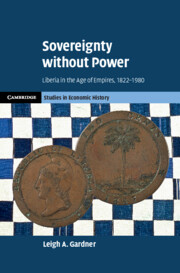Book contents
- Sovereignty without Power
- Cambridge Studies in Economic History
- Sovereignty without Power
- Copyright page
- Dedication
- Contents
- Figures
- Maps
- Tables
- Preface
- Acknowledgments
- 1 Reconstructing the Fragments
- Part I Foundations
- Part II The Art of Survival
- Part III Sovereignty for Sale?
- 8 An African Marshall Plan
- 9 Concessions and Growth
- 10 Selling the Flag
- 11 Sovereignty beyond the Age of Empires
- Book part
- References
- Index
9 - Concessions and Growth
from Part III - Sovereignty for Sale?
Published online by Cambridge University Press: 27 October 2022
- Sovereignty without Power
- Cambridge Studies in Economic History
- Sovereignty without Power
- Copyright page
- Dedication
- Contents
- Figures
- Maps
- Tables
- Preface
- Acknowledgments
- 1 Reconstructing the Fragments
- Part I Foundations
- Part II The Art of Survival
- Part III Sovereignty for Sale?
- 8 An African Marshall Plan
- 9 Concessions and Growth
- 10 Selling the Flag
- 11 Sovereignty beyond the Age of Empires
- Book part
- References
- Index
Summary
Despite its increasingly repressive institutions, Liberia enjoyed rapid economic growth in the 1950s and 1960s. This was due in large part to the expansion of exports produced by foreign companies granted generous concessions by the Liberian government. The first major concession was in 1926 to the Firestone Rubber Company. Rubber exports were the main source of economic growth in the 1930s. This was followed after 1945 with numerous concessions in mining, forestry, and agriculture. This chapter compares Liberia’s economic history during this period with that of Mexico under the presidency of Porfirio Diaz (1876–1911), which also grew rapidly through the attraction of foreign capital. While research on institutions and economic development has often stressed the importance of limited government, periods of economic growth haven often occurred under authoritarian governments through various means to create substitutes for limited government. Histories of Porfirio Diaz’s government have argued that a system of elite coordination and rent-seeking made contracts with foreign companies credible even in the absence of representative institutions. Ultimately, however, this system fractured with the beginning of the Mexican civil war. This chapter argues that a similar system operated in Liberia, and that the inability of the elite to integrate new members resulted in the overthrow of the Americo-Liberian regime in 1980 and, ultimately, the beginning Liberia’s devastating civil wars.
- Type
- Chapter
- Information
- Sovereignty without PowerLiberia in the Age of Empires, 1822–1980, pp. 217 - 245Publisher: Cambridge University PressPrint publication year: 2022

